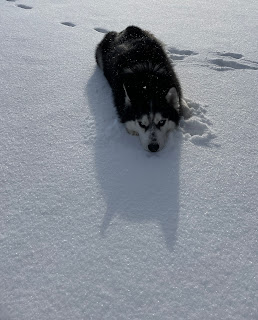Everyone on earth should have something they do just because they like doing it. Y'know. Within the bounds of legality and not harming others. I suspect most writers started out writing simply because they liked doing it. We write for ourselves first, then one day, it crosses our minds to write for an audience and on that day, something fundamentally shifts. No matter how much we talk about writing books or stories of our hearts, once we've committed to the thought of showing our work to someone else, we're no longer strictly writing to please ourselves. Even if we want to. Every whisper or overheard conversation about The Market is looking over our shoulders. It isn't to say that writing can't still be fun - it can. Fun, edifying, and engaging. But. There's also a weight that's been added to it, a pressure to perform, to be good enough. That weight, pressure, and subtle (or not) fear take a little extra helping of cognitive and emotional energy to sustain.
That's why is so vital to have other outlets that don't carry that charge of weight or pressure or fear. We still need to pursue some creative thing that isn't for anyone else. We need the freedom to be bad at something - not because it's fun to be bad at something but because there's space and joy and light around doing something that no one else cares about, where we aren't being badgered to turn fun into a side hustle of some kind. There's grace in getting to just enjoy something without succumbing to the drive of constant improvement. Hey. This is for fun. If I learn something and enjoy what I'm doing? Great. If I just have fun with what I'm doing and never learn another thing? That's great, too. Though, to be fair, it's legit to *try* turning a hobby into a side hustle and then noping out. Been there. Did that with cooking. Catered two big events, got rave reviews, took a look around and went 'oh, hell no' and went straight back to being a cooking hobbyist because yeesh.
These days, I make random things from cardboard. Cat forts. A spirit house in very early stages. There's a massive stack of huge cardboard boxes on the back lanai waiting for me to build a kitty castle. When my box knife comes out of hiding, that project will get underway. At this point, I may have to go buy a box knife cause it's been a minute since I've seen the last one.I still cook. I like finding new recipes and trying dishes I haven't had before. It's taken a turn since I went whole food plant based vegan a few years ago. I had to learn a whole new set of cooking skills that upended a bunch of the conventional wisdom I'd been taught about cooking. It's a good time getting to try a new technique and new flavors. Sometimes I win. Sometimes I have to throw stuff away - not often, mind, but it does happen when I totally misjudge a recipe.
There's also gardening. I do enjoy getting out into the yard to work in the soil and create an oasis for my pollinators. It's a hobby both Mom and I enjoy, so it's a communal activity and the bonus is getting to work in cooperation with someone I value. And hey. Flowers. What's not to like?











